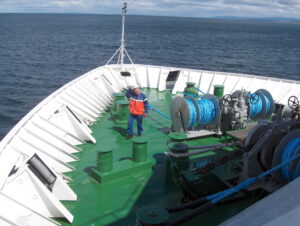» posted on Monday, December 21st, 2020 by Linda Lou Burton
El Poocho and the Sunny Day
Christmas in Antarctica originally posted by Linda Lou Burton December 21, 2005 from Punta Arenas, Chile – Sometimes, things just can’t get any better. The engine noises this morning sounded different. That’s what woke me up. A peep out my bigger-than-a-porthole window gave me two surprises. We had just docked at the Punta Arenas pier, and, the sun was shining!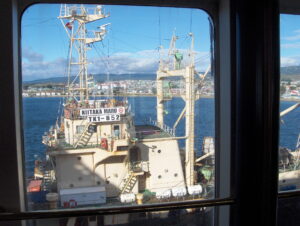
We’d been instructed at the briefing the evening before that our buses would depart from the other end of the pier by 8:30 AM. The sedge-ool was tight, we were warned. The ship had to leave at 3 PM. We’d also been warned about something else. “This is a military pier, so don’t be taking photographs as you walk to the end of it. Utter-vise, you vill be shot unt da bak!” our leader promised.
I had carefully laid out my clothes the night before, so it didn’t take me long to get myself ready to roll and up to the dining room. The eggs were fried today, and I nibbled on some eggwhite and a piece of toast. Should we take our windbreakers, my tablemates pondered? “I always say,” I said to Pamela, “take it, you don’t have to wear it!” We settled on that.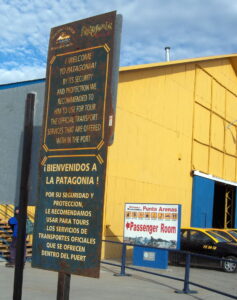
Deck 3, the Security Bar Code Scanner was ready for us. I checked myself out and began the dangerous Walk of the Pier. No military presence was apparent, just a Japanese ship unloading cargo and the Australian Antarctic Dream. I entered the gold CUSTOMS building at the other end and browsed the postcards and knitted woolens. It was only 8:10, and a pleasant 51 degrees.
Needing no woolens, I exited the building in search of my bus. Nordnorge Fitz Roy English was the one I needed. Another bus headed for the Fitz Roy was identified as German. Three buses were chartered for the Otway Penguin Colony. I figured I would see enough penguins in Antarctica. The Fitz Roy promised sheep, and a barbecue!
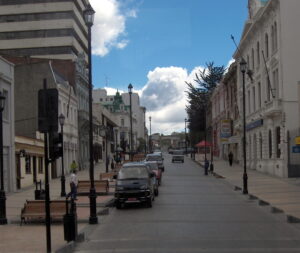 “Hi, I am Patricia!” a smiling tour guide greeted me at the bus. I chose a window seat and piled my things around, settling in for the two-hour ride. Patricia told us about Punta Arenas as we drove through the quiet early morning streets. “The children are on summer holiday,” she explained, “and the businesses do not start so early.” She pointed to monuments, buildings of importance, streets, trees. “It is very windy here,” she said. “There are ropes around town that you can hold onto to keep from being blown down some days.” She explained the history of the area, the industry, the recreation. Punta Arenas is capital of the Magallanes region, on the Strait of Magellan at latitude 54 south. It has a population of 140,000.
“Hi, I am Patricia!” a smiling tour guide greeted me at the bus. I chose a window seat and piled my things around, settling in for the two-hour ride. Patricia told us about Punta Arenas as we drove through the quiet early morning streets. “The children are on summer holiday,” she explained, “and the businesses do not start so early.” She pointed to monuments, buildings of importance, streets, trees. “It is very windy here,” she said. “There are ropes around town that you can hold onto to keep from being blown down some days.” She explained the history of the area, the industry, the recreation. Punta Arenas is capital of the Magallanes region, on the Strait of Magellan at latitude 54 south. It has a population of 140,000.
Soon we were at the edge of town, on Highway 9 headed north, with the sun shining on Estrecho de Magallanes to our right. Patricia told us about the plants and the animals of the region. The driver pulled to the side of the road so we could see the nandu, mother and baby, feeding in the bushes. Nandu is very like ostrich. The driver stopped again to show us guanaco (llama-like), and condor flying overhead.
After a while we turned onto a highway-like graveled road, headed west now, towards Isla Riesco. “We will cross on the ferry there,” Patricia explained, “to get to the Fitz Roy.”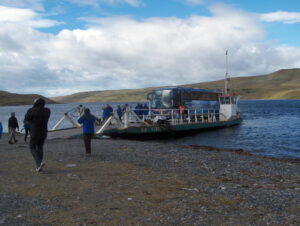
The ferry was just long enough to fit one bus. The waters from Seno de Skyring and Seno Otway funneled through a narrow channel here, with Isla Riesco across the way. Many of us departed the bus for photos as we waited while the wind blew the ferry one way, the engines brought it back to another for alignment. Several fishing boats rested by the landing, the fishermen busy with their morning chores. Finally the bus was on, we stepped across the metal ramp, and off we went. The wind was sharp, but the waves showed no white, only brilliant blue.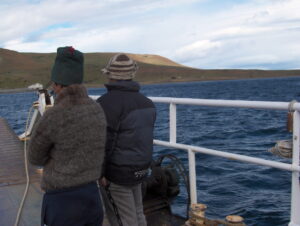
Five minutes to cross. Signs there, Sector Nord, Sector Sud, listing all the farms. Back on the bus, we headed south. We climbed the hill on a narrow gravel road. The waters of the Seno were all around, and flowers colored the low-growth sage as far as you could see with purples, pinks, and yellows. Lupine! Scotch Broom! Through a gate now, over a cattle stop, I see some buildings down ahead.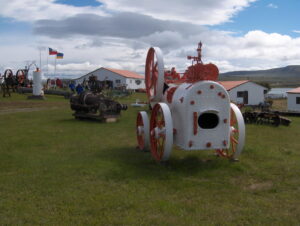
Estancia Fitz Roy is owned by the Fernandez family. I do not know how many acres, but the land slopes to the waters, the wind is constant, it is perfect for raising wooly sheep. The buildings are painted white, every roof is orange. The big barn for shearing the sheep is also a museum, filled with tools from other eras.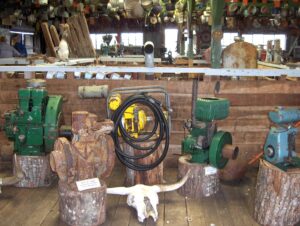
A demonstration is going on, the shearer wears a hat made of wool. He holds the sheep against his chest, her head is angled back, she is resigned. The layers of wool fall to the floor in a pile of dirty gray. The sheep is ready now, for the summer heat.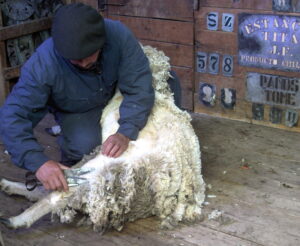
Outside, more sheep wait in the pen. They are dirty gray, not Bo-Peep fluffy white. A black alpaca has been placed inside for calm. His head is higher than mine, he watches to see what I will do. I snap his picture, of course.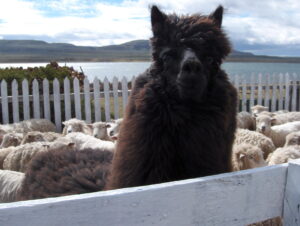
A path ahead, a steeple visible through the trees, a cross. Inside the chapel, an altar, the pews are made of logs, split in half and smoothed.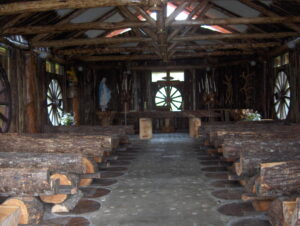
Another path, lined with brilliant yellow bushes, higher than my head. Scotch broom, again. At the end of the path, the smell of food.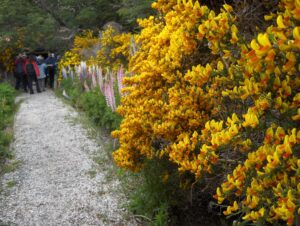
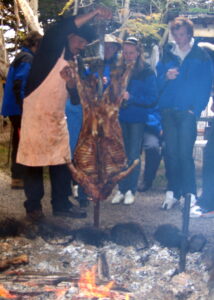 Under a shelter two fires are going. A split of lamb is skewed to a stick beside a pit of fire. A Fernandez family member has a tray, he serves the pisco, strong drink, sour.
Under a shelter two fires are going. A split of lamb is skewed to a stick beside a pit of fire. A Fernandez family member has a tray, he serves the pisco, strong drink, sour.
Inside, another cooking fire, a grill six feet across, lamb is sizzling hot. The room is made of logs, the floor is stone. The large round tables are metal saws, bolted to legs, a strip of metal welded to the edge to cover the sharp; the seats are logs, cut stool-high and padded with wool. Wood stoves scattered around the room, the largest filled with fire, for heat. The others are cold, and serve as tabletops. The food is ready! Bowls heaping with potatoes, peas, green beans, tomatoes, salads. Piles of bread. We take our plates and stand at the grill, to be served the lamb. The Fernandez family circles the room, pouring the Chilean wine, greeting, smiling their welcome.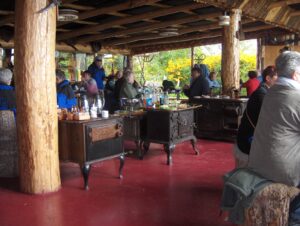
Outside the window wall another show. Sheep are herded inside the fence, a rider on a horse is in command. The sheep turn this way and that, moving as one, till he decides it is time for them to depart the gate. He calls to the dog to direct, and in a flash, the sheep are gone.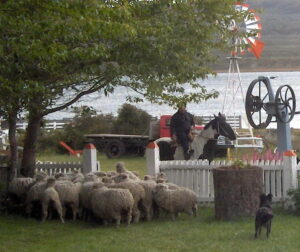
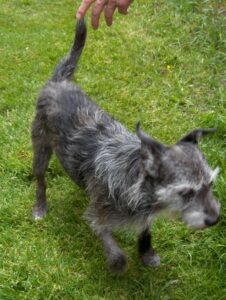 El Poocho. The dog. I’ve read of sheep dogs, collies, intelligent and strong. El Poocho was a mutt. Tiny and gray, more like a terrier, but still a mutt. He owned the farm. He greeted the bus, led the tourists to the barn. He teased the puma in his cage. He told the sheep just where to go, and when. He was friendly. He was in charge! I wandered out, followed him along the lupine path. Stop doggie, stop! I want your picture! Every time I thought he would be still, he lifted his leg to water the plants. Someone clever brought some lamb. Here doggie, here! He stopped to sniff, but did not stay. He barked and ran in circles as we boarded our bus.
El Poocho. The dog. I’ve read of sheep dogs, collies, intelligent and strong. El Poocho was a mutt. Tiny and gray, more like a terrier, but still a mutt. He owned the farm. He greeted the bus, led the tourists to the barn. He teased the puma in his cage. He told the sheep just where to go, and when. He was friendly. He was in charge! I wandered out, followed him along the lupine path. Stop doggie, stop! I want your picture! Every time I thought he would be still, he lifted his leg to water the plants. Someone clever brought some lamb. Here doggie, here! He stopped to sniff, but did not stay. He barked and ran in circles as we boarded our bus.
Senora Fernandez came aboard to bring a gift. Homemade rhubarb jam. Merry Christmas! She said. Across the picket fence, inside the window of her house, I saw a Christmas tree. Outside, the lupine bloomed.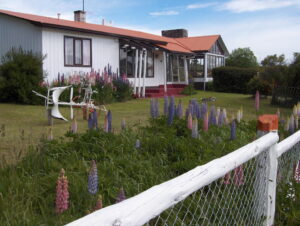
Now, back across the cattle stop, past the hills of sage, down to the ferry stop. The wind was stronger now, the engines could not seem to hold the place, the ferry swayed. A shovel was brought forth, a new path dug. Our driver backed the bus across the new-piled gravel, then the metal ramp, frowning all the while.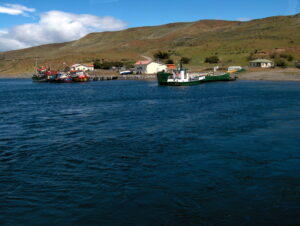
I mostly slept as the bus sped back to Punta Arenas, two hours for the ride. Patricia did not talk much, although I asked to see Isla Riesco on the map. She told me of the coal mines there, but did not know what kind of coal. I saw no signs of mining.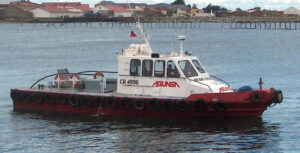
We’re late! The ship was to depart at 3 and it is now 3 PM. The Chilean pilot who guides the ship into the port is waiting for us to leave. Patricia tells us to gather our belongings. “We will drive you to the ship! Get your ID ready!”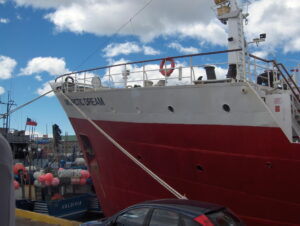
A hurried wave at Customs; the bus zipped along the pier, past the Australian Antarctic Dream, past the Japanese freighter, still unloading cargo. Up the gangplank, beep, I’m coded back onboard.

